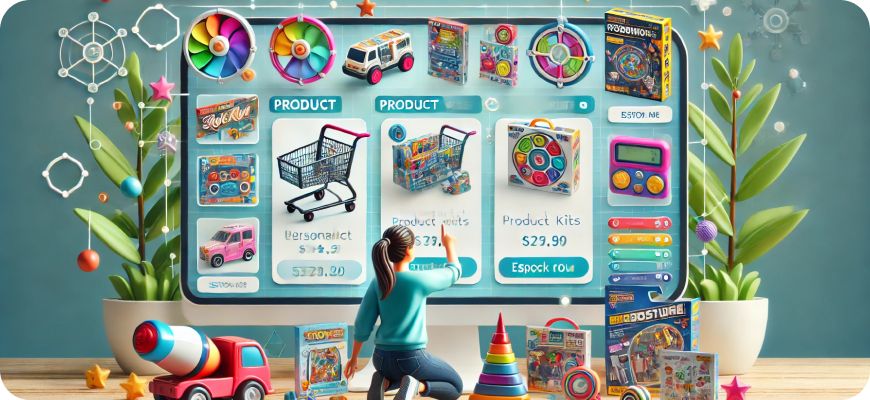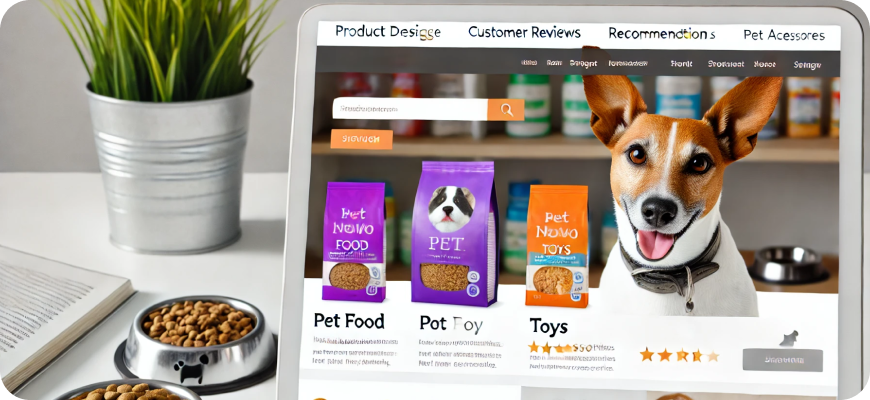top 5 Inventory Management apps for Shopify + A full Comparison
Efficient inventory management is key to running a successful e-commerce business on Shopify. Managing stock levels, tracking inventory across multiple sales channels, and preventing overselling are challenges that can quickly become overwhelming without the right tools. Fortunately, Shopify offers a wide range of inventory management apps that help merchants automate and streamline these processes, saving time and reducing errors. This article explores some of the top inventory management apps for Shopify and provides a full comparison to help you choose the best solution for your store.
1. Stocky by Shopify
Stocky is an inventory management app developed by Shopify to help merchants forecast demand, manage purchase orders, and optimize stock levels. It’s designed to integrate seamlessly with Shopify POS, making it a great choice for merchants with physical and online stores.
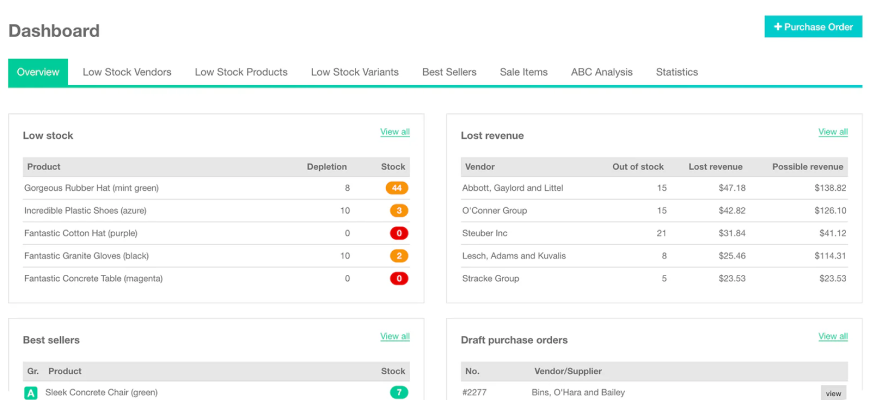
Key Features:
- Demand forecasting and inventory reporting
- Purchase order creation and management
- Low stock alerts and reordering recommendations
- Integration with Shopify POS
- Inventory value reporting
PROS
- Easy integration with Shopify and Shopify POS
- Helps optimize stock levels with demand forecasting
- Intuitive interface with useful reporting tools
CONS
- Limited functionality for more complex inventory needs
- Only available for Shopify POS Pro users
Ideal for:
Merchants using Shopify POS who need basic inventory management and forecasting.
2. TradeGecko (QuickBooks Commerce)
TradeGecko, now part of QuickBooks Commerce, is a robust inventory and order management solution. It’s designed to help merchants manage inventory across multiple channels, automate reordering, and sync data for seamless operations.
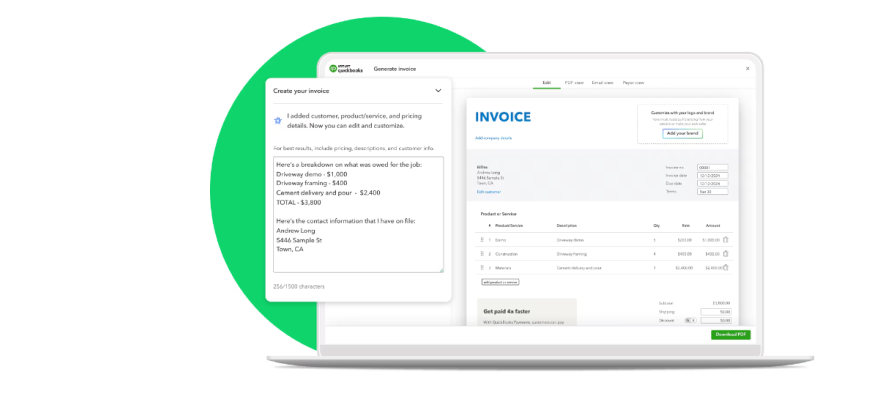
Key Features:
- Multi-channel inventory management and syncing
- Automatic stock updates and reordering
- B2B e-commerce platform support
- Integration with accounting software (QuickBooks)
- Real-time inventory insights
PROS
- Great for multi-channel businesses
- Integration with accounting tools for streamlined operations
- Automated reordering and stock syncing
CONS
- More expensive than basic solutions
- Learning curve for new users
Ideal for:
Medium to large businesses needing comprehensive inventory management and accounting integration.
3. Stock Sync – Inventory & Order
Stock Sync is an inventory management app designed to make it easy to update and sync inventory data from multiple sources, such as suppliers, warehouses, and marketplaces.
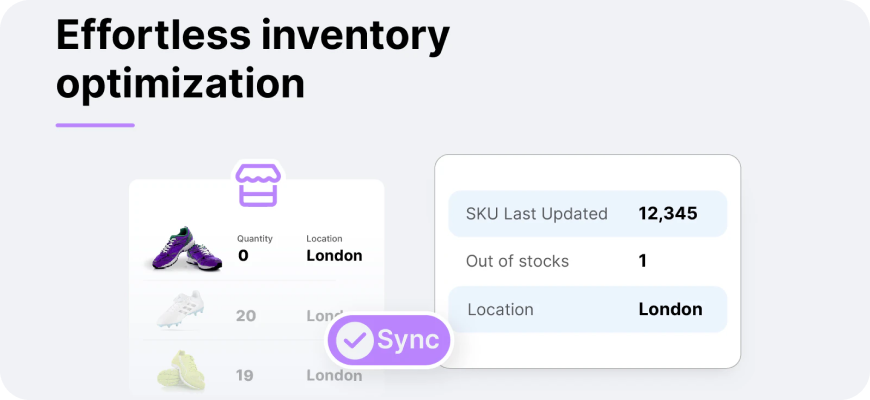
Key Features:
- Automatic stock updates and syncing with suppliers
- Multiple file format support (CSV, XML, JSON)
- Integration with Shopify for seamless data updates
- Supports custom pricing and discounts
- Low stock alerts and order syncing
PROS
- Cost-effective solution for syncing inventory
- Flexible data import/export options
- Great for stores with multiple suppliers
CONS
- Some features may require technical setup
- Interface may seem complex for beginners
Ideal for:
Merchants needing to sync inventory data across multiple sources with customizable updates.
4. Skubana
Skubana offers a comprehensive inventory management system tailored for high-volume e-commerce businesses. It integrates with multiple sales channels, warehouses, and 3PLs to offer real-time inventory visibility and automation.
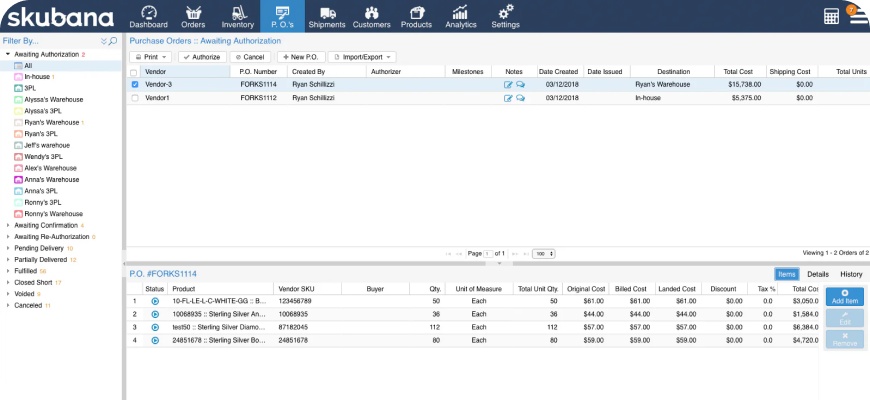
Key Features:
- Multi-channel inventory management
- Real-time stock tracking and order management
- Warehouse and fulfillment center integrations
- Advanced analytics and reporting
- Automated order routing and fulfillment
PROS
- Excellent for high-volume and multi-channel sales
- Powerful automation features for streamlining fulfillment
- Advanced analytics for optimizing inventory
CONS
- High cost compared to basic inventory apps
- Complexity may require training for new users
Ideal for:
Large businesses managing high order volumes and multiple sales channels.
5. Inventory Planner
Inventory Planner helps Shopify merchants forecast inventory needs, optimize stock levels, and manage purchasing more effectively. It’s designed to provide data-driven insights that simplify reordering and reduce stockouts.
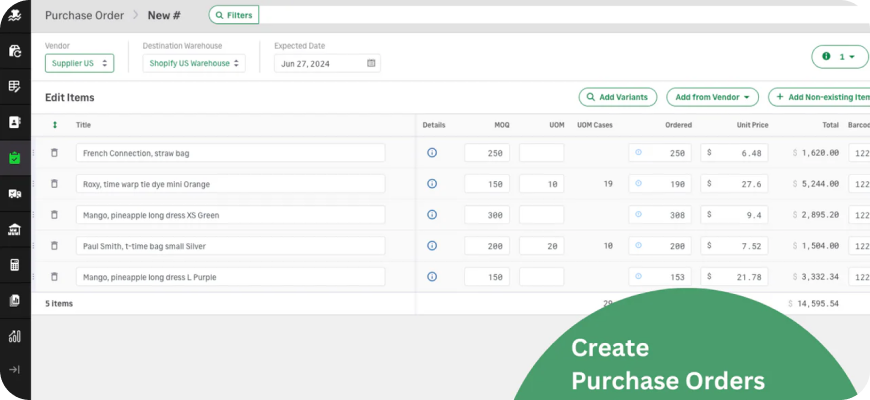
Key Features:
- Demand forecasting and inventory planning
- Customizable purchase order creation
- Inventory replenishment recommendations
- Integrations with multiple sales channels
- Sales performance analytics
PROS
- Accurate demand forecasting to avoid overstocking/understocking
- Easy-to-use interface with robust reporting tools
- Multi-channel support for growing businesses
CONS
- Cost may be high for small businesses
- Limited features for complex order fulfillment
Ideal for:
Merchants seeking data-driven inventory planning and demand forecasting.
Comparison Table
| Feature/Characteristic | Stocky | TradeGecko | Stock Sync | Skubana | Inventory Planner |
|---|---|---|---|---|---|
| Multi-Channel Support | Limited | Yes | Yes | Yes | Yes |
| Demand Forecasting | Yes | Yes | No | Yes | Yes |
| Automatic Reordering | Yes | Yes | Yes | Yes | Yes |
| Warehouse Integration | No | Yes | No | Yes | Limited |
| Real-Time Updates | Limited | Yes | Yes | Yes | Yes |
| Pricing | Medium | High | Low-Medium | High | Medium-High |
| Ideal For | Shopify POS Users | Multi-Channel Sales | Syncing Inventory Data | High-Volume Merchants | Data-Driven Forecasting |
Final Thoughts
Choosing the right inventory management app for your Shopify store depends on the size of your business, the complexity of your inventory needs, and your budget. Stocky is great for merchants using Shopify POS who need simple inventory management and forecasting tools. TradeGecko (QuickBooks Commerce) is ideal for medium to large businesses looking for robust multi-channel support and integration with accounting tools. Stock Sync offers cost-effective inventory synchronization for stores with multiple suppliers, while Skubana excels in managing high-volume sales and complex fulfillment operations. Finally, Inventory Planner is perfect for data-driven merchants seeking accurate demand forecasting and streamlined purchasing.
By evaluating your store’s needs, you can choose the inventory management app that helps streamline your operations, minimize stockouts, and maximize profits. With the right app, you can focus on growing your business and keeping customers satisfied with accurate stock levels and efficient fulfillment processes.

